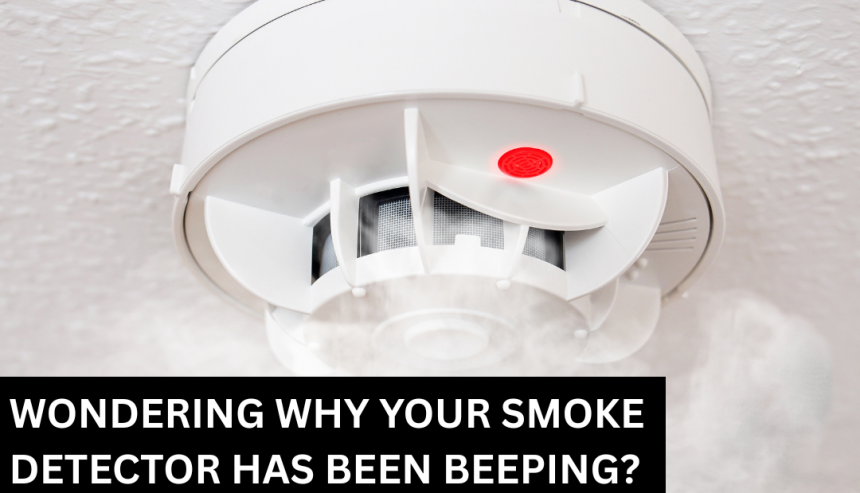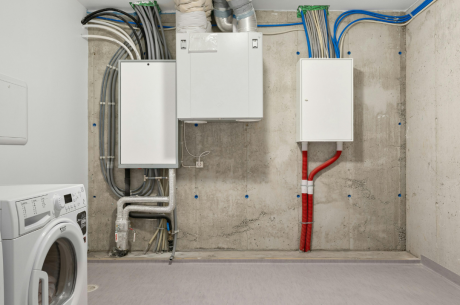Smoke detectors are one of the most important safety devices in any Lawrenceville home or business. They’re designed to save lives by alerting you to the first sign of smoke or fire. But what happens when your smoke detector goes off for no clear reason — especially in the middle of the night?

While it might be frustrating, a randomly beeping or blaring smoke detector is a sign that something needs attention. Sometimes it’s a minor issue, other times it could be an early warning that should not be ignored. In this guide, we’ll break down the most common reasons smoke detectors go off unexpectedly and what you can do about it — with a focus on Lawrenceville’s unique environment and property conditions.
Table of Contents
1. Low Battery or Battery Issues
A low battery is the most common reason smoke detectors chirp or beep without the presence of smoke. Most detectors emit a short, consistent chirp every 30–60 seconds to let you know the battery is running out.
Why it’s common in Lawrenceville:
With seasonal changes in Georgia — from humid summers to chilly winters — battery performance can degrade faster than expected.
Solution:
- Replace batteries at least once a year, ideally during the start of daylight saving time.
- Use high-quality alkaline batteries for longer performance.
2. Dust, Dirt, and Insects Inside the Detector
Over time, dust particles, pet hair, or even tiny insects can get inside the detector’s sensing chamber. This can interfere with the sensors and trigger false alarms.
Why it happens locally:
In Lawrenceville neighborhoods with lots of construction or pollen-heavy seasons, airborne particles can easily enter smoke detectors — especially if windows are often open.
Solution:
- Gently vacuum the smoke detector vents once every few months.
- Use compressed air to blow out debris without damaging internal components.
3. High Humidity and Steam
Humidity and steam can mimic smoke particles inside the sensing chamber, triggering an alarm.
Lawrenceville factor:
Our region’s warm, humid summers can cause indoor humidity levels to rise, especially if you don’t have strong ventilation in bathrooms or kitchens.
Examples:
- A hot shower without the bathroom fan on.
- Cooking without turning on the range hood.
Solution:
- Install detectors at least 10 feet from bathrooms and kitchens.
- Consider using heat detectors in kitchens instead of smoke detectors.
4. Temperature Changes
Sudden temperature shifts can affect smoke detector sensors, especially ionization detectors.
When it happens:
- Turning on the heat for the first time in winter.
- Cold air rushing in from an open door on a hot day.
Why it’s relevant in Lawrenceville:
Georgia’s weather can change rapidly — cool mornings followed by hot afternoons — causing fluctuating indoor temperatures.
Solution:
- Keep detectors away from direct drafts or vents.
- Maintain consistent indoor climate control.
5. Expired Smoke Detectors
Smoke detectors don’t last forever — most have a lifespan of 8–10 years. As they age, sensors become less reliable and more prone to false alarms.
Local property risk:
Many Lawrenceville homes built in the late 2000s are now due for detector replacements.
Solution:
- Check the manufacturing date on the back of your detector.
- Replace outdated units immediately with modern photoelectric or dual-sensor models.
6. Cooking Fumes
Burnt toast, seared meat, or even heavy seasoning can release particles that set off alarms.
Why it happens here:
Georgia households often prepare hearty, smoky BBQ or grilled meals, which can produce lingering cooking smoke.
Solution:
- Use ventilation fans while cooking.
- Place detectors at a safe distance from the kitchen but still within code requirements.
7. Electrical Malfunctions
For hardwired smoke detectors, electrical issues such as power surges or wiring faults can trigger alarms.
Lawrenceville factor:
During summer storms, lightning strikes and power outages are more common, which can cause brief surges in the system.
Solution:
- Have a licensed electrician inspect wiring.
- Install surge protectors for added safety.
8. Nearby Construction or Renovations
Renovation dust and construction activities near your property can introduce fine particles into your detectors.
Example:
If your Lawrenceville neighborhood is experiencing rapid development — which is common in areas like Sugarloaf or near Lawrenceville Square — your detectors may be more exposed to airborne irritants.
Solution:
- Temporarily cover detectors during major indoor renovations (but uncover them immediately afterward).
- Schedule regular cleanings.
9. Strong Chemicals or Aerosols
Cleaning sprays, paint fumes, or strong scents can interfere with the detector’s sensors.
Solution:
- Avoid spraying near detectors.
- Use proper ventilation when cleaning or painting.
10. Actual Early Fire Indicators
Sometimes, what seems like a false alarm is actually a real but early warning. Overheated appliances, smoldering wires, or a forgotten candle could produce minimal smoke but still trigger a detector.
Preventing False Alarms in Lawrenceville Homes and Businesses
- Test Detectors Monthly – Press the test button to ensure they’re working properly.
- Clean Regularly – Remove dust, insects, and debris.
- Replace Every 8–10 Years – Upgrade to newer, more reliable models.
- Use the Right Detector Type – Photoelectric detectors for smoldering fires, ionization for fast-flaming fires, or dual-sensor for both.
- Maintain Good Ventilation – Reduce humidity, cooking smoke, and steam buildup.
When to Call a Professional
If your smoke detector keeps going off randomly despite regular maintenance, it’s time to call in a professional. At PuroClean of Lawrenceville, we can:
- Inspect and clean smoke detectors during post-fire cleanup services.
- Check for lingering smoke residue after small kitchen fires.
- Perform odor removal and air quality restoration to prevent future false alarms.
Final Thoughts
In Lawrenceville, a smoke detector going off randomly can be caused by anything from low batteries to high humidity — or even an early sign of danger. Staying proactive with maintenance, cleaning, and timely replacement can prevent unnecessary scares while ensuring your safety.
If you’ve experienced smoke damage, fire hazards, or any unexpected alarms and want a thorough inspection, PuroClean of Lawrenceville is here to help 24/7.
10 FAQs on Causes of Smoke Detector Randomly Going Off
1. Why does my smoke detector keep going off when there’s no fire?
Smoke detectors can be triggered by dust, insects, steam, humidity, cooking smoke, or even low battery signals. In Lawrenceville homes, seasonal humidity changes and pollen can also contribute.
2. Can humidity cause my smoke alarm to go off?
Yes. High humidity, common in Lawrenceville summers, can cause condensation inside the alarm, leading to false triggers.
3. How often should I replace my smoke detector battery?
Most manufacturers recommend changing batteries at least once a year, even if the detector hasn’t beeped a low-battery warning.
4. Could dust or bugs be triggering my smoke detector?
Absolutely. Dust, cobwebs, and small insects can interfere with the alarm’s sensor. Regular cleaning can prevent this.
5. Why does my smoke detector chirp every few minutes?
A chirping noise usually means the battery is low or the detector needs maintenance. In older devices, it could also mean the entire unit needs replacing.
6. How long does a smoke detector last before needing replacement?
Most detectors should be replaced every 8–10 years. Check the manufacturer’s date on the back of your device.
7. Can cooking cause false alarms even if there’s no fire?
Yes. Smoke from frying, grilling, or even toasting bread can trigger alarms. Consider using a range hood fan when cooking.
8. Is it dangerous if my smoke detector keeps going off without reason?
While it may be a false alarm, constant activation can desensitize you to warnings. It’s important to inspect and fix the cause quickly.
9. Should I hire a professional to inspect my smoke detectors?
Yes, especially if you’ve tried cleaning and changing batteries but the problem persists. Professionals can identify wiring issues or device malfunctions.
10. Can power surges affect my smoke detector?
Yes. After storms or electrical issues, some wired detectors in Lawrenceville homes can malfunction and need resetting or replacement.




 PuroClean of Lawrenceville
PuroClean of Lawrenceville